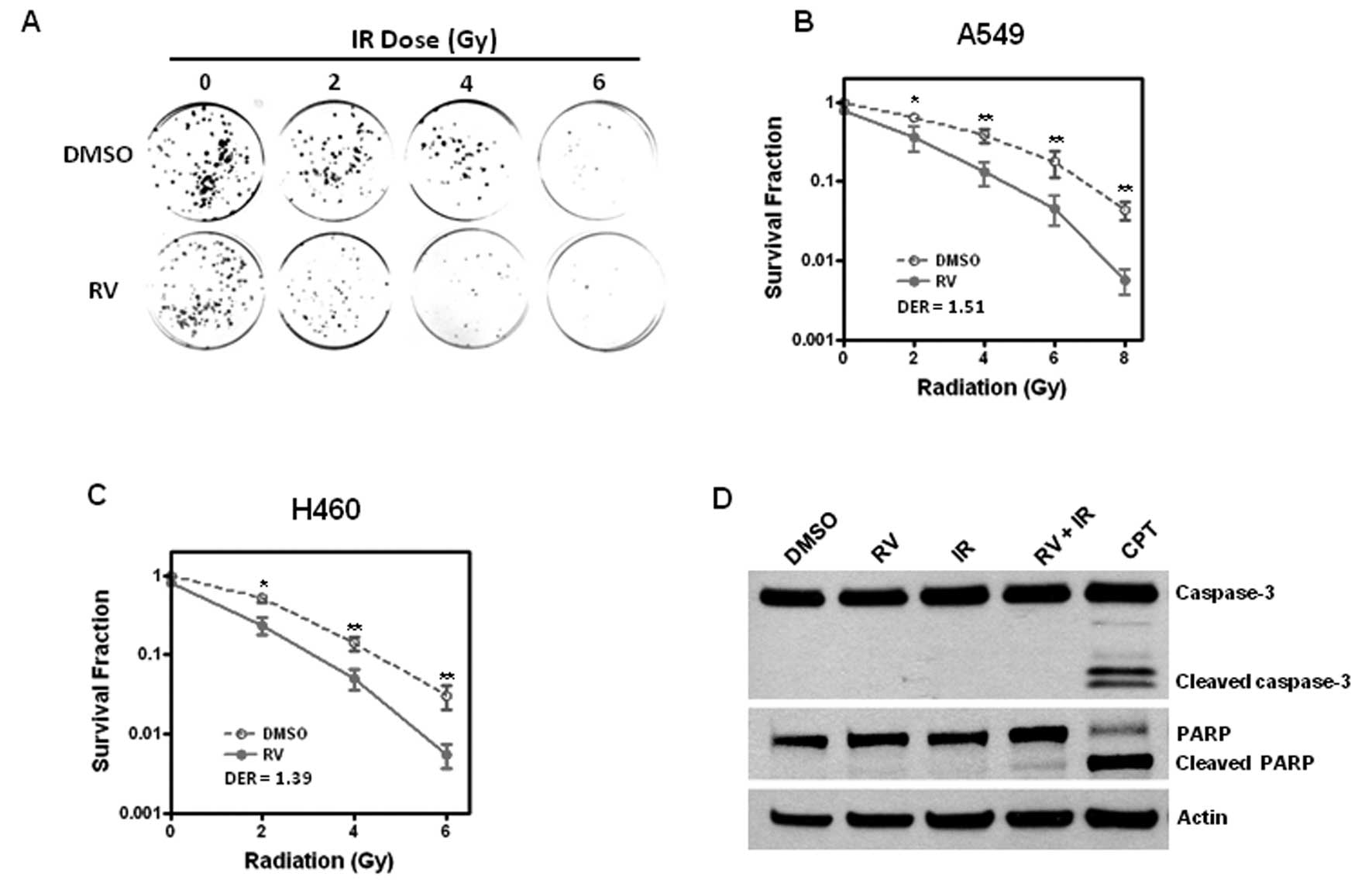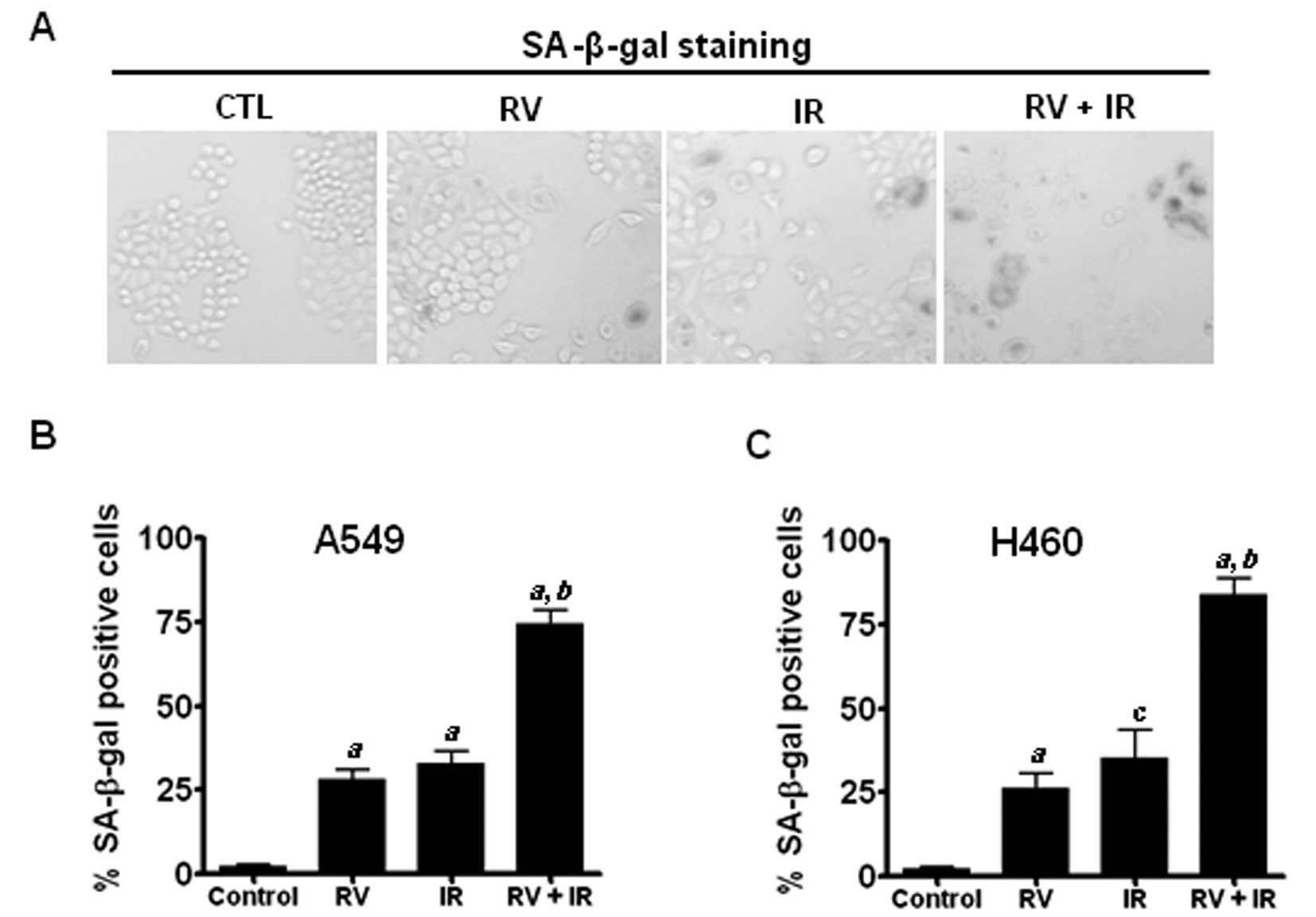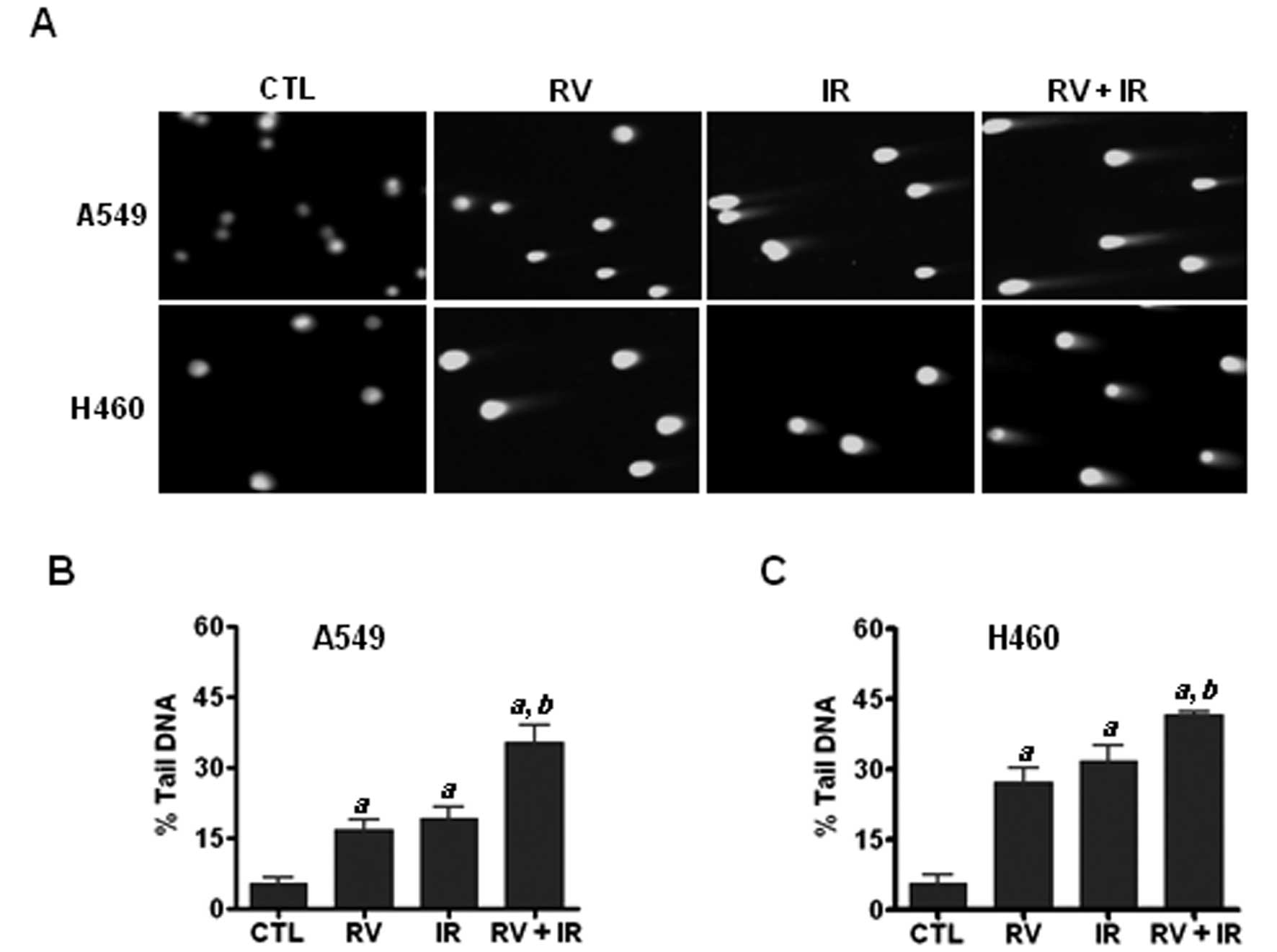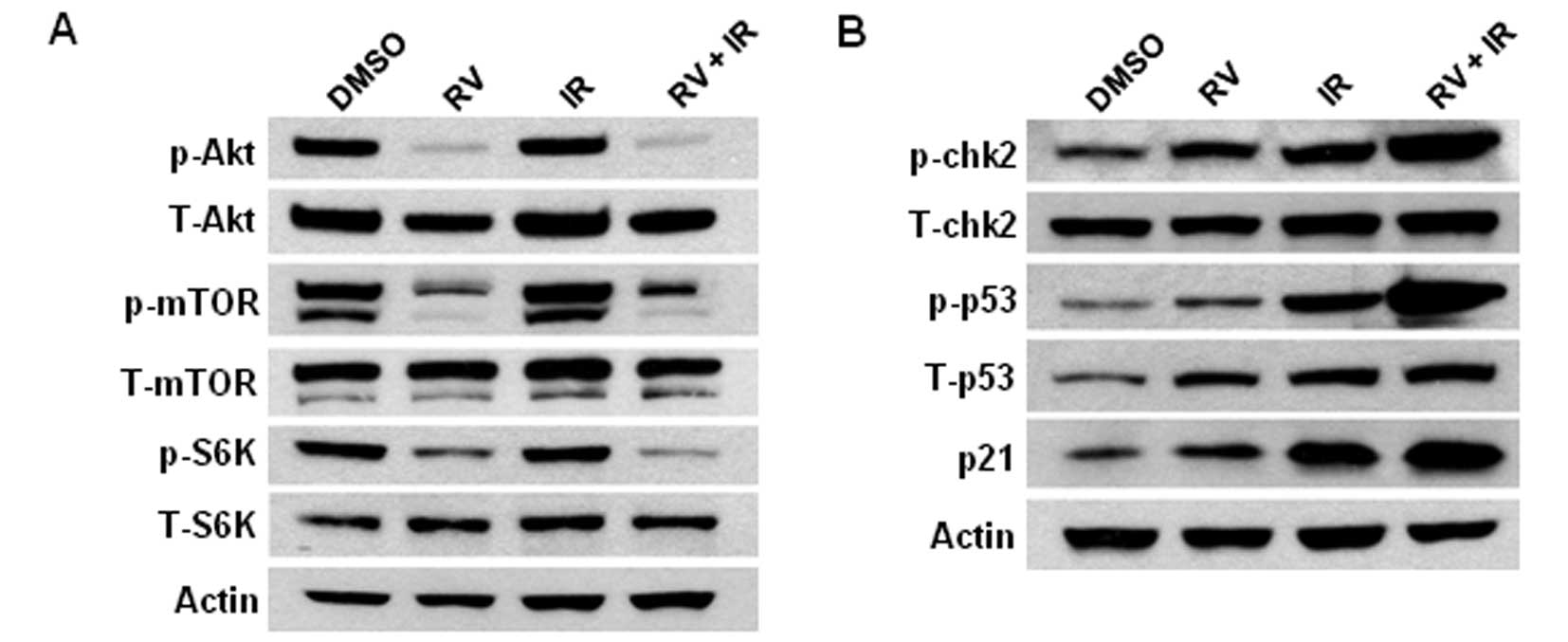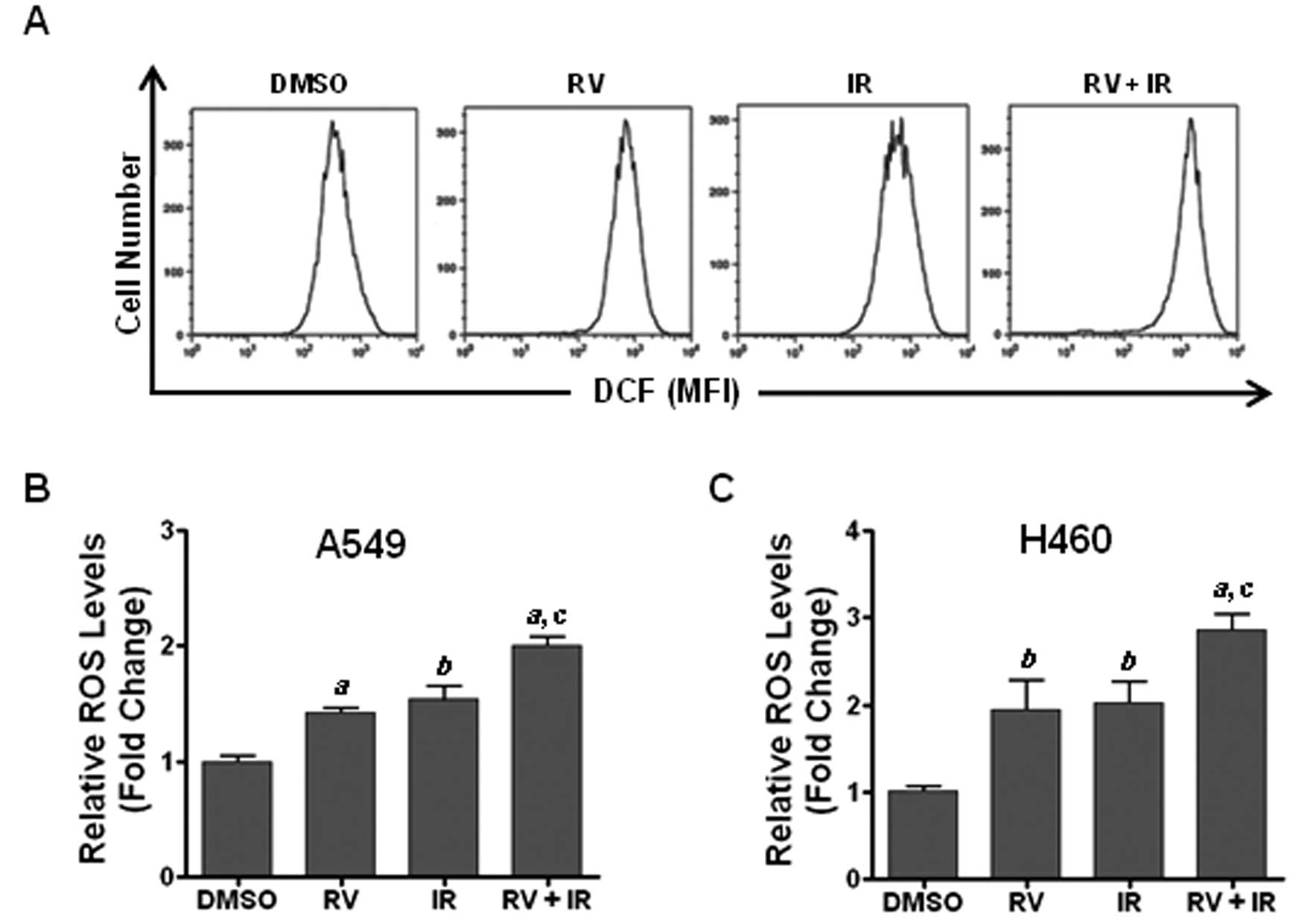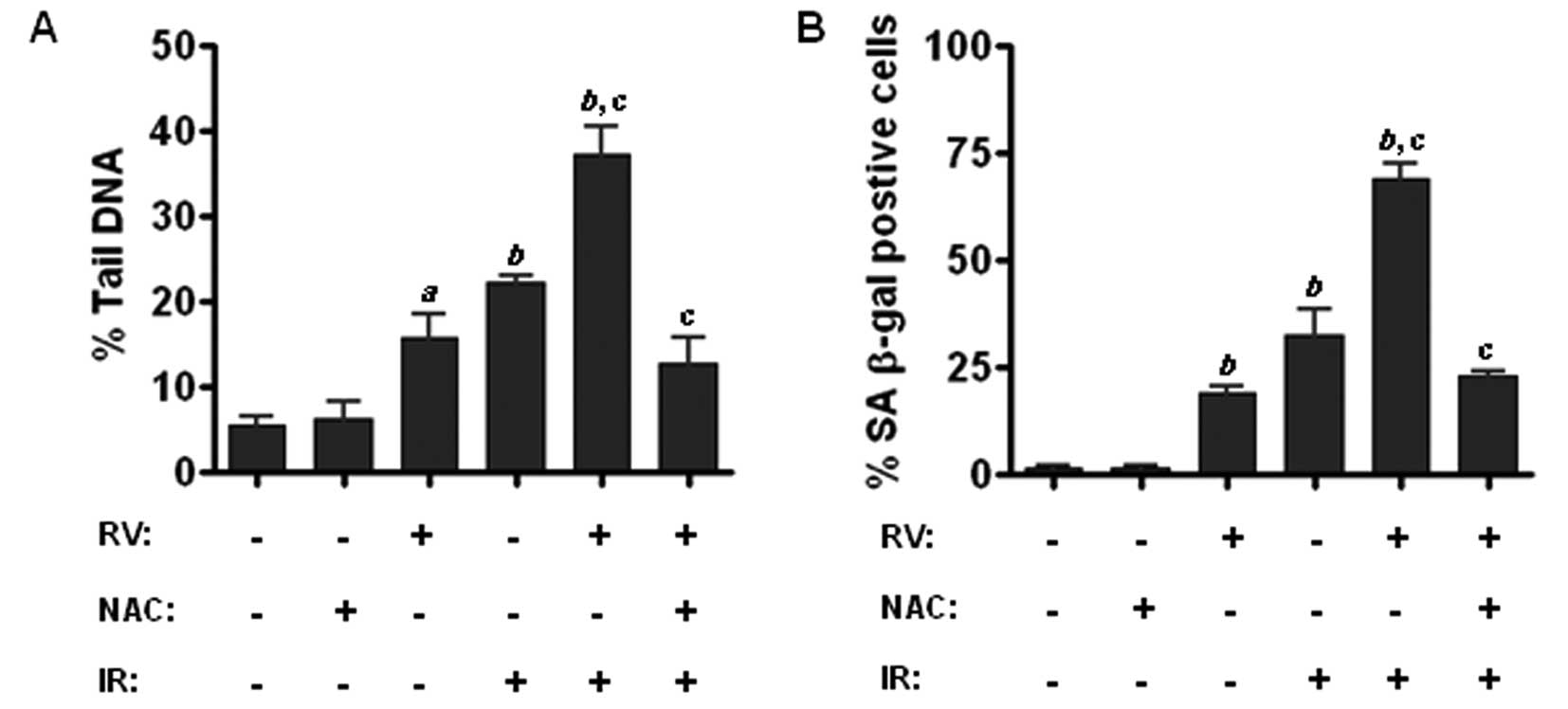|
1.
|
Hall EJ and Wu CS: Radiation-induced
second cancers: the impact of 3D-CRT and IMRT. Int J Radiat Oncol
Biol Phys. 56:83–88. 2003. View Article : Google Scholar : PubMed/NCBI
|
|
2.
|
Gupta SC, Kannappan R, Reuter S, et al:
Chemosensitization of tumors by resveratrol. Ann NY Acad Sci.
1215:150–160. 2011. View Article : Google Scholar : PubMed/NCBI
|
|
3.
|
Sale S, Tunstall RG, Ruparelia KC, et al:
Comparison of the effects of the chemopreventive agent resveratrol
and its synthetic analog trans 3,4,5,4′-tetramethoxystilbene
(DMU-212) on adenoma development in the Apc(Min+) mouse and
cyclooxygenase-2 in human-derived colon cancer cells. Int J Cancer.
115:194–201. 2005.PubMed/NCBI
|
|
4.
|
Gullett NP, Ruhul Amin AR, Bayraktar S, et
al: Cancer prevention with natural compounds. Semin Oncol.
37:258–281. 2010. View Article : Google Scholar : PubMed/NCBI
|
|
5.
|
Bhat KP, Lantvit D, Christov K, et al:
Estrogenic and antiestrogenic properties of resveratrol in mammary
tumor models. Cancer Res. 61:7456–7463. 2001.PubMed/NCBI
|
|
6.
|
Scarlatti F, Sala G, Ricci C, et al:
Resveratrol sensitization of DU145 prostate cancer cells to
ionizing radiation is associated to ceramide increase. Cancer Lett.
253:124–130. 2007. View Article : Google Scholar : PubMed/NCBI
|
|
7.
|
Baatout S, Derradji H, Jacquet P, et al:
Enhanced radiation-induced apoptosis of cancer cell lines after
treatment with resveratrol. Int J Mol Med. 13:895–902.
2004.PubMed/NCBI
|
|
8.
|
Zoberi I, Bradbury CM, Curry HA, et al:
Radiosensitizing and anti-proliferative effects of resveratrol in
two human cervical tumor cell lines. Cancer Lett. 175:165–173.
2002. View Article : Google Scholar : PubMed/NCBI
|
|
9.
|
Rashid A, Liu C, Sanli T, et al:
Resveratrol enhances prostate cancer cell response to ionizing
radiation. Modulation of the AMPK, Akt and mTOR pathways. Radiat
Oncol. 6:1442011. View Article : Google Scholar : PubMed/NCBI
|
|
10.
|
Wang Y, Scheiber MN, Neumann C, et al:
MicroRNA regulation of ionizing radiation-induced premature
senescence. Int J Radiat Oncol Biol Phys. 81:839–848. 2011.
View Article : Google Scholar : PubMed/NCBI
|
|
11.
|
Jones KR, Elmore LW, Jackson-Cook C, et
al: p53-dependent accelerated senescence induced by ionizing
radiation in breast tumor cells. Int J Radiat Biol. 81:445–458.
2005. View Article : Google Scholar : PubMed/NCBI
|
|
12.
|
Schmitt CA: Cellular senescence and cancer
treatment. Biochim Biophys Acta. 1775:5–20. 2007.PubMed/NCBI
|
|
13.
|
Braig M, Lee S, Loddenkemper C, et al:
Oncogene-induced senescence as an initial barrier in lymphoma
development. Nature. 436:660–665. 2005. View Article : Google Scholar : PubMed/NCBI
|
|
14.
|
Guo X, Keyes WM, Papazoglu C, et al: TAp63
induces senescence and suppresses tumorigenesis in vivo. Nat Cell
Biol. 11:1451–1457. 2009. View
Article : Google Scholar : PubMed/NCBI
|
|
15.
|
Ewald JA, Desotelle JA, Wilding G and
Jarrard DF: Therapy-induced senescence in cancer. J Natl Cancer
Inst. 102:1536–1546. 2010. View Article : Google Scholar : PubMed/NCBI
|
|
16.
|
Luo H, Yount C, Lang H, et al: Activation
of p53 with Nutlin-3a radiosensitizes lung cancer cells via
enhancing radiation-induced premature senescence. Lung Cancer.
81:167–173. 2013. View Article : Google Scholar : PubMed/NCBI
|
|
17.
|
Rusin M, Zajkowicz A and Butkiewicz D:
Resveratrol induces senescence-like growth inhibition of U-2 OS
cells associated with the instability of telomeric DNA and
upregulation of BRCA1. Mech Ageing Dev. 130:528–537. 2009.
View Article : Google Scholar : PubMed/NCBI
|
|
18.
|
Luo H, Yang A, Schulte BA, et al:
Resveratrol induces premature senescence in lung cancer cells via
ROS-mediated DNA damage. PLoS One. 8:e600652013. View Article : Google Scholar : PubMed/NCBI
|
|
19.
|
Wang Y, Meng A and Zhou D: Inhibition of
phosphatidylinostol 3-kinase uncouples
H2O2-induced senescent phenotype and cell
cycle arrest in normal human diploid fibroblasts. Exp Cell Res.
298:188–196. 2004.PubMed/NCBI
|
|
20.
|
Wang Y, Liu L, Pazhanisamy SP, et al:
Total body irradiation selectively induces persistent oxidative
stress in murine hematopoietic stem cells. Free Radic Biol Med.
48:348–356. 2010. View Article : Google Scholar : PubMed/NCBI
|
|
21.
|
Nicholson DW, Ali A, Thornberry NA, et al:
Identification and inhibition of the ICE/CED-3 protease necessary
for mammalian apoptosis. Nature. 376:37–43. 1995. View Article : Google Scholar : PubMed/NCBI
|
|
22.
|
Lazebnik YA, Kaufmann SH, Desnoyers S, et
al: Cleavage of poly (ADP-ribose) polymerase by a proteinase with
properties like ICE. Nature. 371:346–347. 1994. View Article : Google Scholar : PubMed/NCBI
|
|
23.
|
te Poele RH, Okorokov AL, Jardine L, et
al: DNA damage is able to induce senescence in tumor cells in vitro
and in vivo. Cancer Res. 62:1876–1883. 2002.PubMed/NCBI
|
|
24.
|
Kao GD, Jiang Z, Fernandes AM, et al:
Inhibition of phosphatidylinositol-3-OH kinase/Akt signaling
impairs DNA repair in glioblastoma cells following ionizing
radiation. J Biol Chem. 282:21206–21212. 2007. View Article : Google Scholar : PubMed/NCBI
|
|
25.
|
Baur JA and Sinclair DA: Therapeutic
potential of resveratrol: the in vivo evidence. Nat Rev Drug
Discov. 5:493–506. 2006. View
Article : Google Scholar : PubMed/NCBI
|
|
26.
|
Jiang H, Zhang L, Kuo J, et al:
Resveratrol-induced apoptotic death in human U251 glioma cells. Mol
Cancer Ther. 4:554–561. 2005. View Article : Google Scholar : PubMed/NCBI
|
|
27.
|
Cui J, Sun R, Yu Y, et al:
Antiproliferative effect of resveratrol in pancreatic cancer cells.
Phytother Res. 24:1637–1644. 2010. View
Article : Google Scholar : PubMed/NCBI
|
|
28.
|
Scott E, Steward WP, Gescher AJ and Brown
K: Resveratrol in human cancer chemoprevention - choosing the
‘right’ dose. Mol Nutr Food Res. 56:7–13. 2012.
|
|
29.
|
Patel KR, Scott E, Brown VA, et al:
Clinical trials of resveratrol. Ann NY Acad Sci. 1215:161–169.
2011. View Article : Google Scholar : PubMed/NCBI
|
|
30.
|
Sibley GS, Jamieson TA, Marks LB, et al:
Radiotherapy alone for medically inoperable stage I non-small-cell
lung cancer: the Duke experience. Int J Radiat Oncol Biol Phys.
40:149–154. 1998. View Article : Google Scholar : PubMed/NCBI
|
|
31.
|
Sura S, Yorke E, Jackson A and Rosenzweig
KE: High-dose radiotherapy for the treatment of inoperable
non-small cell lung cancer. Cancer J. 13:238–242. 2007. View Article : Google Scholar : PubMed/NCBI
|
|
32.
|
Rosenzweig KE, Fox JL, Yorke E, et al:
Results of a phase I dose-escalation study using three-dimensional
conformal radiotherapy in the treatment of inoperable nonsmall cell
lung carcinoma. Cancer. 103:2118–2127. 2005. View Article : Google Scholar
|
|
33.
|
Senra JM, Telfer BA, Cherry KE, et al:
Inhibition of PARP-1 by olaparib (AZD2281) increases the
radiosensitivity of a lung tumor xenograft. Mol Cancer Ther.
10:1949–1958. 2011. View Article : Google Scholar : PubMed/NCBI
|
|
34.
|
Yang H, Yoon SJ, Jin J, et al: Inhibition
of checkpoint kinase 1 sensitizes lung cancer brain metastases to
radiotherapy. Biochem Biophys Res Commun. 406:53–58. 2011.
View Article : Google Scholar : PubMed/NCBI
|
|
35.
|
Nagata Y, Takahashi A, Ohnishi K, et al:
Effect of rapamycin, an mTOR inhibitor, on radiation sensitivity of
lung cancer cells having different p53 gene status. Int J Oncol.
37:1001–1010. 2010. View Article : Google Scholar : PubMed/NCBI
|
|
36.
|
Calabrese CR, Almassy R, Barton S, et al:
Anticancer chemosensitization and radiosensitization by the novel
poly (ADP-ribose) polymerase-1 inhibitor AG14361. J Natl Cancer
Inst. 96:56–67. 2004. View Article : Google Scholar : PubMed/NCBI
|
|
37.
|
Kim KW, Moretti L, Mitchell LR, et al:
Combined Bcl-2/mammalian target of rapamycin inhibition leads to
enhanced radiosensitization via induction of apoptosis and
autophagy in non-small cell lung tumor xenograft model. Clin Cancer
Res. 15:6096–6105. 2009. View Article : Google Scholar : PubMed/NCBI
|
|
38.
|
Cottart CH, Nivet-Antoine V,
Laguillier-Morizot C and Beaudeux JL: Resveratrol bioavailability
and toxicity in humans. Mol Nutr Food Res. 54:7–16. 2010.
View Article : Google Scholar
|
|
39.
|
Boocock DJ, Faust GE, Patel KR, et al:
Phase I dose escalation pharmacokinetic study in healthy volunteers
of resveratrol, a potential cancer chemopreventive agent. Cancer
Epidemiol Biomarkers Prev. 16:1246–1252. 2007. View Article : Google Scholar : PubMed/NCBI
|
|
40.
|
Trachootham D, Zhou Y, Zhang H, et al:
Selective killing of oncogenically transformed cells through a
ROS-mediated mechanism by beta-phenylethyl isothiocyanate. Cancer
Cell. 10:241–252. 2006. View Article : Google Scholar
|
|
41.
|
Trachootham D, Alexandre J and Huang P:
Targeting cancer cells by ROS-mediated mechanisms: a radical
therapeutic approach? Nat Rev Drug Discov. 8:579–591. 2009.
View Article : Google Scholar : PubMed/NCBI
|
|
42.
|
Miyajima A, Nakashima J, Yoshioka K, et
al: Role of reactive oxygen species in
cis-dichlorodiammineplatinum-induced cytotoxicity on bladder cancer
cells. Br J Cancer. 76:206–210. 1997. View Article : Google Scholar : PubMed/NCBI
|















